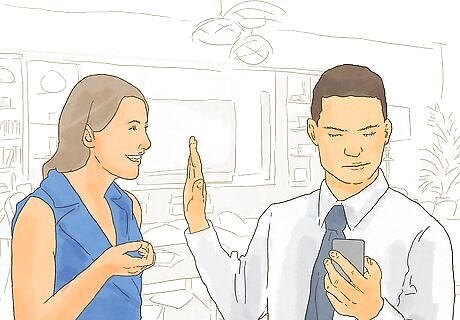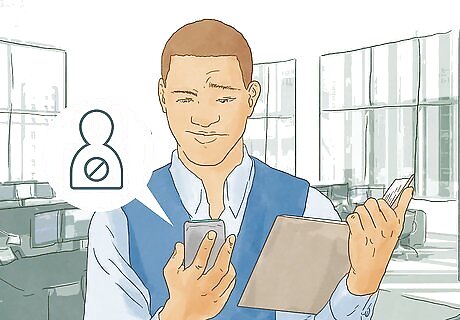
views
Communicating Verbally

Communicate your boundaries. Be clear but polite about any boundaries that you have with the annoying person. These boundaries can remain the same or they can change depending on the conversation or circumstance. You can give a reason for your boundary to minimize hurting their feelings, but you do not have to explain your boundaries. For example, if a classmate is always interrupting your study session you might say something like, “I don’t mean to be rude but I have two more hours to study before my exam.”

Ask for a friend’s help. Sometimes being direct with an annoying person isn’t an option or isn’t working. If someone is constantly annoying you, you might consider enlisting the help of a friend. Discuss this with your friend and suggest that your friend “rescue” you when the annoying person is around. For example, when you have a guest who is going to visit your home and often overstays their welcome, coordinate a plan with a friend to call at a certain time. Your friend can call and need you to help them with an emergency. Keep in mind that this technique is probably only going to work one time.

Set a time limit for the conversation. Be clear about the amount of time that you have to talk to an annoying person before they begin the conversation. Let the annoying person about the commitment that you have that restricts your time with them. Then, be sure to stick to that time commitment. You might say something like, “I only have five minutes to chat right now. I am working on a deadline.” to a co-worker who keeps bothering you in your office.

Dismiss annoying strangers. The world has no shortage of rude or obnoxious people. The best way to deal with these annoying strangers is not to deal with them at all. Even if they say something that irritates you, let it go and stay focused on yourself. If someone says something that you find to be annoying as you walk by, just keep walking and don’t acknowledge them.

Be honest with annoying friends. If you have an annoying friend or co-worker, it might help if you have a conversation with them. Be as polite as possible, and point out specific behaviors that annoy you and/or other people. Make it clear that you are not trying to upset them, but you have noticed that they are having trouble interacting well with other people in your group. You could say something like “I don’t want you to take this too hard, but you get way too close to people when you talk. It invades everyone’s personal space, and they feel uncomfortable.”
Utilizing Body Language

Minimize eye contact. Focus your eyes on something else instead of giving the annoying person eye contact. Most people understand the importance of eye contact during a conversation. If they get the hint, they will likely end the conversation. Focus your eyes on your computer if you are sitting at your desk. Use your cell phone as a distraction from the annoying person.

Pretend that you are tired, sick, or have somewhere to be. You could force yourself to yawn, or blow your nose several times to make the act convincing. This will allow you to quickly excuse yourself from the conversation without being offensive. If you don't feel like you can pull off faking a cold, just say that you have another obligation and you can't be late. You could tell the person that you are meeting someone for coffee/lunch/dinner, and that you have to leave right now. If you say something like "I haven't felt well for days," and blow your nose, the annoying person is likely to let you end the conversation and go home.

Step back from the conversation. When you are stuck standing by an annoying person who is trying to converse with you, start taking steps away from the person. Make it seem like you have somewhere that you need to go. Then, politely excuse yourself from the conversation.

Make it difficult for them to stay. Don’t allow the annoying person to get comfortable in your presence. Avoid being hospitable when they visit. You can do this subtly without being blatantly rude. Don’t offer the annoying person a place to sit. If you have seats available, occupy them with your purse, coat, or paperwork. Avoid offering the rude person a cup of coffee or a drink of water. Be sure to sit at a table that would be too small for them to accompany you.
Limiting Your Contact

Keep your interactions short. Having long conversations with an annoying person will imply that you are interested in talking to them. Keep your conversations brief and to the point. Even if you aren’t rude, the person is likely to move on to someone else who is more accommodating to their need for attention. If they do insist on talking for longer than you want, excuse yourself from the conversation. If you attempted to make a conversation about an assignment short and sweet, but the other person jumped right into talking about something else, excuse yourself to go restroom and end the conversation.

Avoid them when possible. If you have routine interaction with an annoying person, consider trying to avoid them. Avoid going to places that you know that they will be. Try to be uninviting to keep them from wanting to be around you. Shift your schedule so that you just barely miss the time that you would normally pass them. You could also consider taking a different route to your class, office, or other routine destination. If this annoying person is a co-worker, try shutting your door to keep them from bothering you in your office. Change up your lunchtime or eating place to avoid an annoying classmate or co-worker.

Ignore the person. Most people like to receive attention. Sometimes, even negative attention will give that person some satisfaction. You can make the interaction less appealing to the other person if you ignore them as much as possible. This clearly states that you are not interested in interacting with them. It may take several tries, but the annoying person is likely to get bored or flustered with trying to interact with you.

Withhold virtual responses. If you are dealing with an annoying person regularly, it is likely that they will have your cell number or add you to social media. There is a good chance that they will feel comfortable contacting you any time through electronic media. The best way to handle this is to keep your responses few and far between. You can also choose not to respond at all. For example, if an annoying person messages you saying something like “Hey, what are you doing,” you can respond by saying something like “Hi, I’m working on my lawn. I can’t really talk at the moment.” If they continue to message you, it is best to just ignore them. You can also hide posts made by people on your social media feeds. Just go to one of their posts and click the ‘Unfollow,’ ‘Mute,’ or other comparable button.




















Comments
0 comment